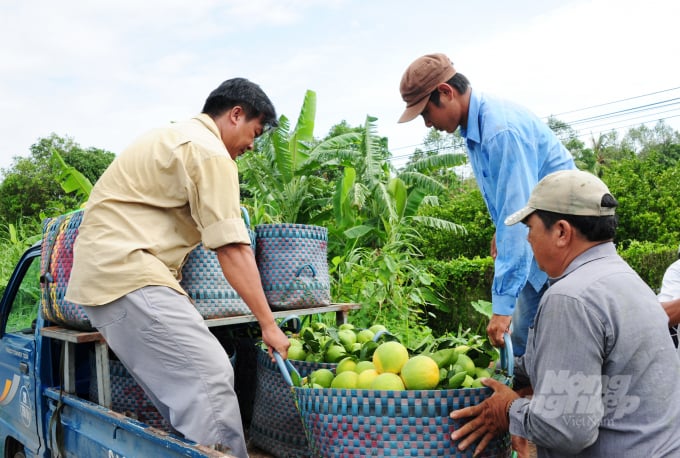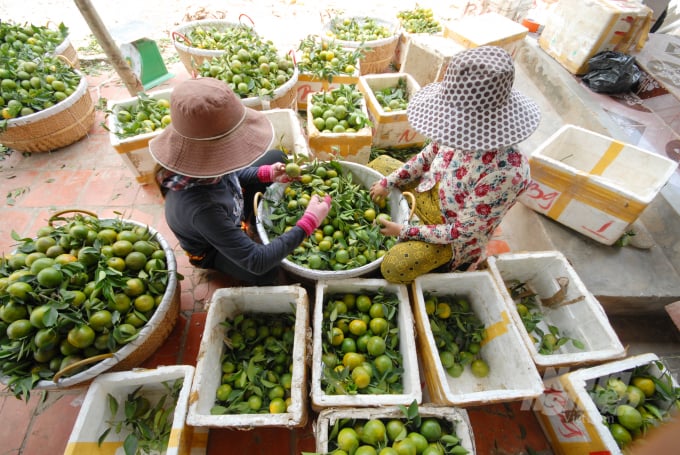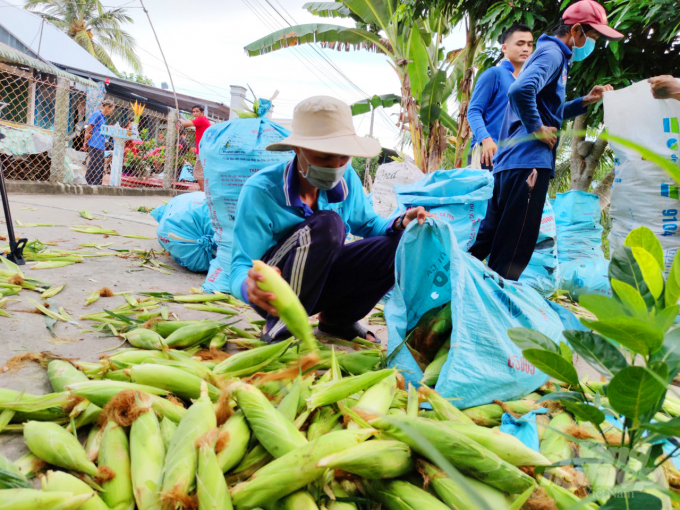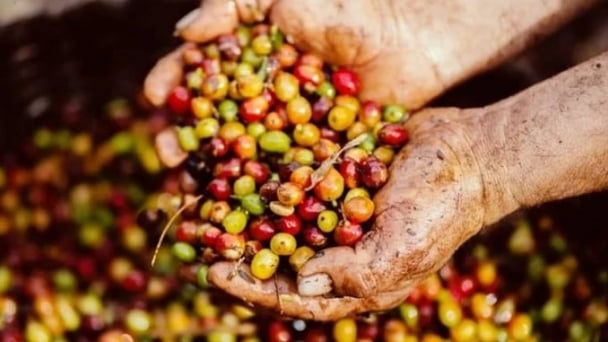June 18, 2025 | 10:01 GMT +7
June 18, 2025 | 10:01 GMT +7
Hotline: 0913.378.918
June 18, 2025 | 10:01 GMT +7
Hotline: 0913.378.918

Vinh Thoi Clean Agricultural Products Cooperative (Lai Vung district, Dong Thap province) specializes in providing clean fruits. Photo: Le Hoang Vu.
According to the Ministry of Agriculture and Rural Development, the Mekong Delta region has great advantages to develop diversified commodity agriculture to meet the needs of domestic and foreign markets.
However, the Mekong Delta region has been simultaneously affected by climate change, extreme weather, sea-level rise; hydroelectricity exploitation, increase amount of water for agricultural production in the upper Mekong River; over-exploitation of groundwater and sand in the riverbed of the Mekong Delta; Flood control activities and unsustainable agricultural practices in the Mekong Delta. These factors act simultaneously complement each other, making the Mekong Delta's agriculture more and more severely negatively affected.
Climate change has been causing damage to agricultural production in the Mekong Delta, including agricultural cooperatives and member households. The survey results in 2020 by the Institute of Policy and Strategy for Agriculture and Rural Development (MARD), showed that: 80.3% of surveyed cooperatives said that climate change has occurred in the past 5 years with 3 common phenomena: saltwater intrusion, drought and extreme weather (thunderstorm, heavy rain, flood).
Up to 96.6% of cooperatives recorded the phenomenon of climate change, confirming that climate change had a negative impact on cooperatives' agricultural production.
Negative effects include increased production costs, reduced crop and livestock productivity, loss of unharvested crops, reduced product quality, and loss of agricultural land.
Climate change events increase production costs across all crop and aquaculture groups. In which, saline intrusion caused the highest production cost, with an average increase of 29.1%; followed by drought (27.6%); other climate change events (23.1%) and extreme weather (2.7%). On average, climate change increases the cost of agricultural production by 26.2%.
The cooperative survey results show that climate change increases the cost of rice production by 18%; fruit trees 34.5%; aquaculture 36.8% and other crops (such as vegetables) 31.7% in case of saltwater intrusion.

Climate change has a strong impact on the activities of agricultural cooperatives in the Mekong Delta. Photo: Le Hoang Vu.
80% of cooperatives assessed that the impact of climate change phenomena on increasing costs of agricultural and fishery production in the past 5 years (2016-2020) tends to be more and more severe.
According to a 2019 study, in the event of a sea-level rise of 1meter, the total rice production of the Mekong Delta could decrease by 40% without appropriate response measures. In addition, due to severe weather conditions and the occurrence of many diseases, the yield of many crops such as rice and maize will decrease.
Under the medium climate change scenario, the yield of the winter-spring crop is forecast to decrease by 716.6 kilograms per hectares, and the summer-autumn crop by about 795 kilograms by 2050. This will lead to a decrease of about 1.48 million tonnes of rice. Maize yield may decrease by 782 kilograms per hectares, resulting in a reduction of about 880,000 tonnes.
Another factor leading to a decrease in crop yields is the reduction of sediments due to being trapped upstream. According to experts' calculations, the cumulative impact of hydropower projects on the Mekong River can reduce from 6% to 10% nutrient sources for the Mekong Delta, crop yield is forecasted to decrease by 0.6-1 tonne per ha.
A survey by the Institute of Policy and Strategy for Agriculture and Rural Development in 2020, showed that saltwater intrusion causes a decrease in productivity by 41.5%. Next is the term, reducing 35.8%; extreme weather reduces 27.9% and other phenomena reduce 28.3%.
Fruit trees had the biggest decrease in yield (decreased by 49.6%), aquatic products decreased by 43.9%, rice decreased by 24.9% and other crops decreased by 30%. On average, climate change causes a reduction in crop and livestock productivity by 35.2%.
Cooperatives affected by climate change may lose their area, reduce product quality, reduce agricultural land area due to landslides, or drought or salinity too much to be cultivated.
Also, climate change affects the seasons, changing the season structure. Sustainable agricultural livelihoods are at risk of being lost. A part of farmers is likely to have to change (or trade-off) their livelihood, this proportion in the Mekong Delta is forecasted to be not small.

MARD is drafting the Prime Minister's Decision approving the project to improve the climate change adaptation capacity of agricultural cooperatives in the Mekong Delta, for the 2021-2025 period. Photo: Le Hoang Vu.
Currently, there are many ways to adapt to climate change through non-structural measures. In particular, the construction of farmer communities directly engaged in agricultural production through the cooperatives' development and rural communities is considered the most appropriate.
Accordingly, to promote the participation of agricultural cooperatives and agricultural producers in the Mekong Delta to effectively adapt to climate change, promote the application of non-structural solutions to adapt to climate change in the coming time, the Ministry of Agriculture and Rural Development is drafting the Prime Minister's Decision approving the project to improve the climate change adaptation capacity of agricultural cooperatives in the Mekong Delta, for the 2021-2025 period.
According to the draft, the goal is that by 2025, 100% of agricultural cooperatives in the Mekong Delta region will be propagated and fostered to raise awareness and understanding about climate change and adaptation measures in production, business, and conservation, processing of agriculture, forestry, fishery, and salt production.
Each province will build 3-5 cooperative models to apply effective adaptation measures to climate change, develop and replicate circular economy models; Periodically organize regional forums for collective economy and cooperatives to share information and experience in agricultural production.
Contributing to the goal of 70% of agricultural cooperatives being classified as good or higher; at least 50% of agricultural cooperatives participate in agricultural production and business linkage chains; The cooperative's production and business revenue increase by at least 20%.
Translated by Ha Phuc
![Turning wind and rain into action: [8] Real-time salinity detection and early warning technology](https://t.ex-cdn.com/nongnghiepmoitruong.vn/608w/files/news/2025/06/17/z6704423696987_15fd32ffc26d590d204d520c9dac6786-nongnghiep-151127.jpg)
(VAN) Thanks to the integration of modern hydrological-hydraulic models, remote sensing technologies, and artificial intelligence, the accuracy of hydrological forecasting has significantly improved.
![Turning wind and rain into action: [7] Early disaster warnings help marine farmers minimize losses](https://t.ex-cdn.com/nongnghiepmoitruong.vn/608w/files/news/2025/06/17/z6704423696987_15fd32ffc26d590d204d520c9dac6786-nongnghiep-142942.jpg)
(VAN) In recent years, thanks to early disaster warnings and forecasting, marine farmers in Khanh Hoa province have been able to reduce risks and losses, thereby improving production efficiency.
![Turning wind and rain into action: [6] ‘Four on-the-spot’ disaster management software](https://t.ex-cdn.com/nongnghiepmoitruong.vn/608w/files/news/2025/06/17/e5a48259d6a262fc3bb3-nongnghiep-183800.jpg)
(VAN) By simply activating the scenario on the disaster management software, the relevant authorities immediately know how many households need to be evacuated, where to evacuate them to, and by what means of transportation…
![Turning wind and rain into action: [5] Hue applies modern technology in disaster forecasting](https://t.ex-cdn.com/nongnghiepmoitruong.vn/608w/files/news/2025/06/17/z6704423696987_15fd32ffc26d590d204d520c9dac6786-nongnghiep-093938.jpg)
(VAN) In Hue city, modern technology has recently been applied in meteorological and hydrological forecasting and warning, helping to reduce the damage caused by natural disasters.

(VAN) A cutting-edge farming technique being implemented on an experimental ranch in Arizona's Sonoran Desert has already saved a billion gallons of water over five years, according to Civil Eats.

(VAN) Poultry and pig production and the environment can be boosted through enhanced water technology, according to new research.

(VAN) Coffee prices on June 16, 2025 are unchanged. In Vietnam, local trading prices are holding steady, ranging around VND 112,000 – VND 112,500/kg.